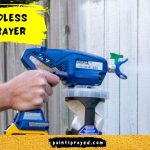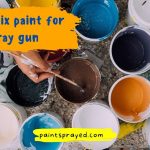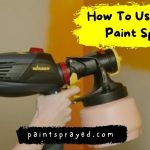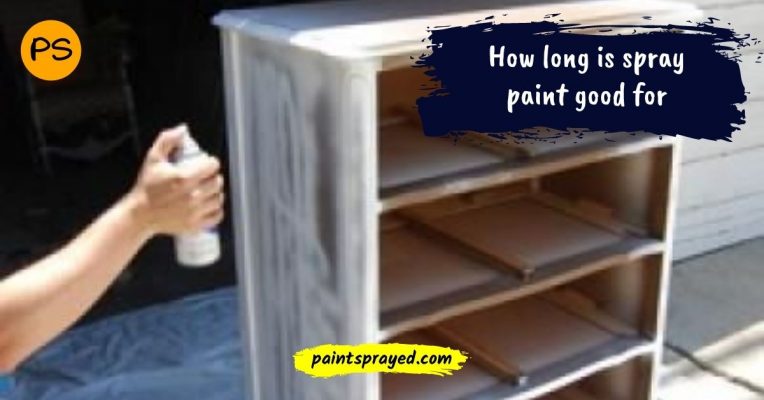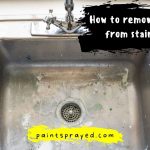Ever wondered why you shake a can of spray paint before ready to paint? Ever thought about why there’s a ball in spray paint cans?
This guide explains to anyone why is there a ball in spray paint, what it’s for, and how it works. If you are a newbie then this blog post is must read for you.
These are some basic things that a beginner should know whenever he/she wants to start painting. I will explain the purpose of the ball and will tell you why the steel ball is placed in all spray cans.
Why is there a ball in spray paint?
The pea-sized metal ball inside a can of spray paint serves an important purpose: it helps maintain the propellant-paint mixture inside the can.
When you shake a can of spray paint, the pea agitates the mixture, ensuring that the ingredients remain properly mixed.
This is important because if the propellant and paint separate, the spray paint will not work properly.
What is the purpose of a ball in spray paint?
Most aerosol paints also have a metal, marble, glass, or plastic ball called a pea inside of the can. The ball is there to help mix the paint as you shake it.
Without the ball, the paint would separate and you would have to mix it every time you wanted to use it.
Why do spray bottles have a ball inside?
Spray bottles typically have a ball inside them in order to help keep the seal tight and prevent leakage.
Depending on the design, either gravity or a small spring may be used to keep the ball in place.
This helps to ensure that only the desired amount of liquid is released when the bottle is squeezed.
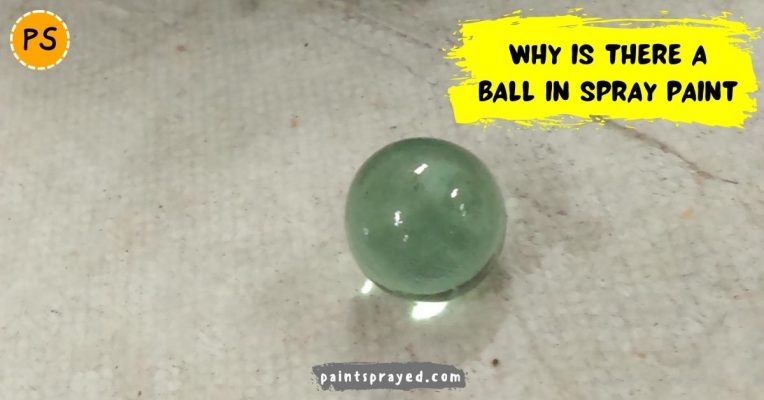
Why do you need to shake spray paint?
Spray paint cans typically have a little ball inside that helps to mix the paint as you shake it. If you don’t shake the can before using it, the paint will be clumpy and uneven.
It’s important to give the can a good shake – about 30 seconds – so that the paint is properly mixed and will give you a nice, even finish.
Where does the little ball go in a spray bottle?
When you are ready to use your spray bottle, the little ball needs to be in the correct position.
The cylinder on the left goes over the group on the right, and the ball is pressed into the underside of the hole.
This will ensure that the ball is in the right place to create a seal and prevent the contents of the bottle from leaking out.
What is the dot on top of a spray can for?
The dot on top of a spray can is used to block the water passageway. Depending on the design, either gravity or a small spring holds this ball against the seal. This prevents the water from leaking out of the can.
What happens if you don’t shake your spray paint?
If you don’t shake your spray paint before using it, the paint pigments will have separated inside the can and will have sunk to the bottom.
This will cause the paint to be uneven and patchy when applied to your surface. To avoid this, always shake your spray paint can vigorously for a minute or two before using it.
What to do if Spray paint can ball stuck?
There are a few things you can do to try and get the ball out of the can. First, you can try shaking the can vigorously. If that doesn’t work, you can try tapping the can on a hard surface.
If neither of those methods works, then you can try heating the can up. Put the can in a pot of boiling water for a few minutes, then take it out and try shaking it again.
If the ball still won’t come out, then you’ll need to puncture the can and get the ball out that way.
Can You Stop A Paint Spray Can From Rattling?
You can stop a paint can from rattling only if the pea is made of metal.
If it is made of metal you can hold a strong magnet to the bottom of the can and the pea will be attracted to the magnet and stop rattling around.
If the pea is made of plastic then the only way to stop the rattling is to put the lid on tight and hope that it stops.
Why is there a marble in spray paint?
A marble in spray paint is used as a mixing ball to ensure that the paint is properly mixed and that the pigments are evenly distributed throughout the can.
The marble inside the can will roll around as the can is shaken, helping to mix the paint and keep it from separating or settling.
This makes sure that the paint will spray out of the can in a consistent and even manner, resulting in a more professional and polished finish on the surface being painted.
What does the ball inside spray paint look like?
The ball inside spray paint cans is typically made of steel and is quite small, usually around the size of a BB pellet.
The ball is typically coated with a rust-resistant material to ensure that it does not corrode and contaminate the paint.
Some manufacturers also use stainless steel balls which are also rust-resistant and can withstand the pressure and chemical inside the can.
The ball is also designed to withstand the pressure inside the can and to roll around easily so that it can effectively mix the paint.
What is the shaky thing in spray paint?
The “shaky thing” in spray paint refers to the small steel or stainless steel ball that is included inside the can to mix the paint.
This small ball, typically around the size of a BB pellet, is placed inside the can along with the paint.
As the can is shaken, the ball rolls around inside, helping to mix the paint and keep the pigments evenly distributed.
This ensures that the paint will spray out of the can in a consistent and even manner, resulting in a more professional and polished finish on the surface being painted.
The ball is also known as an agitator or mixer.
How do you spray paint without bumps?
Here are a few tips for achieving a smooth, even finish when spray painting:
- Start by thoroughly cleaning and sanding the surface to be painted. This will help the paint adhere better and will create a smooth surface for the paint to go on.
- Use high-quality paint with low viscosity (thickness) and shake the can well before starting to paint.
- Use light, even strokes when spraying, moving the can in a steady, back-and-forth motion. Hold the can about 6-8 inches away from the surface and overlap each pass slightly to ensure even coverage.
- Use thin coats rather than thick ones. The less paint you have on the surface, the less likely it will be to drip or sag.
- Allow ample dry time between coats.
- It’s important to use proper spray paint technique, it’s important to keep the can moving, and not stop in one spot for too long, as this will cause drips.
- If you see any drips or bumps after the paint has dried, lightly sand the surface and apply a second coat if needed.
By following these tips, you should be able to achieve a smooth, even finish when spray painting.
It’s always a good idea to practice on a piece of scrap material before applying the paint to the final surface.
What does the ball inside of a spray paint can look like?
The ball inside of spray paint can is typically a small, spherical metal object that serves as an agitator.
Its purpose is to mix the paint and solvent inside the can and ensure a consistent flow of paint when the can is used.
The ball is typically made of stainless steel or another durable metal that can withstand the harsh chemicals in the paint.
It is usually held in place by a metal spring or wire cage, which allows it to move freely inside the can.
When you shake a spray paint can, the ball moves around inside, mixing the paint and solvent.
When you press down on the spray nozzle, the paint is forced out of the can and through the nozzle, where it is atomized into a fine mist.
The ball helps to ensure that the paint flows smoothly and evenly, providing a consistent and uniform application.
Why does my spray paint have bumps?
Bumps in spray paint can occur for several reasons, including:
- Insufficient shaking: If the can is not shaken enough, the paint and solvent inside may not be properly mixed, leading to bumps and clumps in the paint. To avoid this, make sure to shake the can for at least a minute after the ball rattles, and continue to shake it periodically during use.
- Old or expired paint: Over time, paint can settle and separate, causing bumps. If the paint has been stored for an extended period of time or has reached its shelf life, it may not perform as well. In this case, it’s best to discard the can and purchase a fresh one.
- Incorrect spray technique: Bumps can also occur if you hold the can too close to the surface you’re painting or if you apply the paint too thickly. Make sure to follow the instructions on the can and hold the can the recommended distance from the surface to avoid this.
- Clogged nozzle: If the nozzle becomes clogged, paint can build up inside and cause bumps or streaks in the spray. To avoid this, clean the nozzle after each use and replace it if it becomes damaged.
If you’re experiencing bumps in your spray paint, try shaking the can more thoroughly, and checking the age of the paint.
Adjusting your spray technique, and cleaning or replacing the nozzle. If the problem persists, consider purchasing a new can of paint.
What is the use of ball in spray paint can?
The ball in a spray paint can serves an important purpose in helping to ensure that the paint is properly mixed and dispensed.
The ball is usually made of steel or plastic, and is placed inside the can along with the paint.
When the can is shaken, the ball moves around inside, mixing the paint and any other components that are in the can, such as solvents or propellants.
As the can is used, the ball continues to move around and helps to prevent the paint from settling or separating.
This ensures that the spray paint comes out evenly and with consistent color and texture.
Without the ball, the paint could become thick and clumpy at the bottom of the can, or the color and texture could be uneven.
Therefore, the ball is an important component in ensuring the quality and consistency of spray paint.
Why is there a metal ball in setting spray?
Setting spray is typically a liquid or mist that is used to set makeup and help it last longer. It is not typically sold in a spray can like spray paint.
However, some makeup products, such as liquid foundation or concealer, may contain a metal ball in the packaging to help with mixing.
The metal ball helps to break up any clumps and evenly distribute the product.
When the product is shaken, the ball moves around inside the container, agitating the product and helping to ensure that it is well mixed before application.
This can improve the application of the product, ensuring that it goes on smoothly and evenly.
It’s important to note that not all makeup products contain a metal ball, and it’s typically only included in products that have a tendency to separate or settle over time, such as liquid foundations or concealers.
If you are using a setting spray that comes in a can, it may contain a different mechanism for ensuring that the product is well mixed before use.
What is the dot in spray paint?
The dot in spray paint is a small colored circle or dot that is often found on the top of the spray can. The dot serves as a quick reference guide for identifying the color of the paint inside the can.
Manufacturers of spray paint typically use a universal system for marking the tops of their cans, where each color is assigned a unique dot or series of dots.
For example, a can of red paint might have a single red dot on the top, while a can of green paint might have two green dots.
The dot system is designed to make it easy for consumers to quickly identify the color of the paint they need, without having to read the label or search through a pile of cans.
This can be especially helpful for people who use spray paint frequently, such as artists, DIY enthusiasts, and professionals in fields like automotive or industrial design.
It’s important to note that not all spray paint brands use the dot system, and some may use a different system for identifying colors.
Additionally, the dot may not always be accurate or reliable, as the color of the paint inside can be affected by factors such as age, temperature, and storage conditions.
What size ball is inside a spray can?
The size of the ball inside a spray can depends on the manufacturer and the specific product.
Generally, the ball is around 1/4 inch to 3/8 inch in diameter, which is roughly the size of a BB pellet.
The ball is typically made of steel or another hard material and is used to help mix the paint or other contents of the can when it is shaken.
By rolling around inside the can, the ball helps to break up any clumps or sediment that may have settled at the bottom, ensuring a consistent and even application of the spray paint.
It’s important to note that the size and material of the ball may vary depending on the type of spray can and the intended use.
Always read the manufacturer’s instructions and guidelines before using any spray paint product.
What happens if you don’t shake spray paint?
Shaking spray paint before use is an important step that helps to ensure the paint is properly mixed and applied evenly.
If you don’t shake the can, the paint inside may not be thoroughly mixed, which can result in a splotchy or uneven finish.
This is because the pigments and other ingredients in the paint can settle at the bottom of the can over time, especially if the can has been sitting on a shelf or in storage for a while.
By shaking the can, you help to distribute these ingredients evenly throughout the paint, ensuring a consistent color and texture.
Shaking also helps to mix in any solvents or other chemicals that may have separated from the paint, which can affect the quality and durability of the finish.
Additionally, not shaking the can can lead to clogging or other issues with the spray nozzle.
If the paint inside is not properly mixed, it may not spray out of the nozzle correctly, resulting in a poor-quality finish or a clogged nozzle that needs to be cleaned or replaced.
In summary, shaking spray paint before use is an essential step that helps to ensure a smooth, even finish and prevents issues with the spray nozzle.
Always be sure to follow the manufacturer’s instructions and guidelines for best results.
Why Does a Ball Form in Spray Paint and How to Fix It?
A ball can form in spray paint due to a variety of reasons, including inadequate shaking or agitation, clogged or dirty spray nozzles, or faulty or low-quality paint.
This ball is typically the steel or plastic ball inside the can that is used to help mix the paint when shaken.
When the ball becomes stuck or is not rolling freely, it can cause a buildup of paint around it, resulting in a clump or ball formation.
This can lead to uneven coverage, clogging of the spray nozzle, or other issues that can affect the quality of the paint job.
To fix a ball that has formed in spray paint, there are a few steps you can take. The first step is to gently shake the can to redistribute the paint and reposition the ball.
If the ball is stuck or not rolling freely, you can try tapping the bottom of the can on a hard surface or using a thin tool, such as a nail or screwdriver, to gently dislodge it.
If the spray nozzle is clogged or not working properly, you can try cleaning it with warm water or a specialized spray nozzle cleaner.
It’s important to always follow the manufacturer’s instructions for cleaning and maintenance to avoid damaging the nozzle or the can.
If the issue persists or the paint quality is still poor, it may be necessary to replace the can or switch to a higher-quality spray paint product.
Always read the instructions and guidelines for the specific product you are using and follow best practices for proper storage and use to prevent issues with ball formation and other common spray paint problems.
In summary, a ball can form in spray paint due to a variety of factors, including inadequate shaking, clogged nozzles, or low-quality paint.
To fix the issue, gently shake the can, dislodge the ball if necessary, clean the nozzle, or switch to a higher-quality product if needed.
Summary of why is there a ball in spray paint
I hope you have enjoyed this article about why is there a ball in spray paint.
I know that this was a bit of a random topic, but it was very interesting to learn about especially for newbies because I wanted to know what is its purpose.
If you have any other questions or comments, please let me know anytime in the comments section and I, and my painter fellows will answer your queries. Thanks for reading!

Matthew Edward is a professional painter who loves to paint and wants to share useful tips and tricks which he had learned in many years of experience in painting. He also used many products that can be used for painting he has tried and tested each and every product to give an unbias opinion about it in his review. This blog is very useful for those newbies who want to learn painting without making mistakes.

